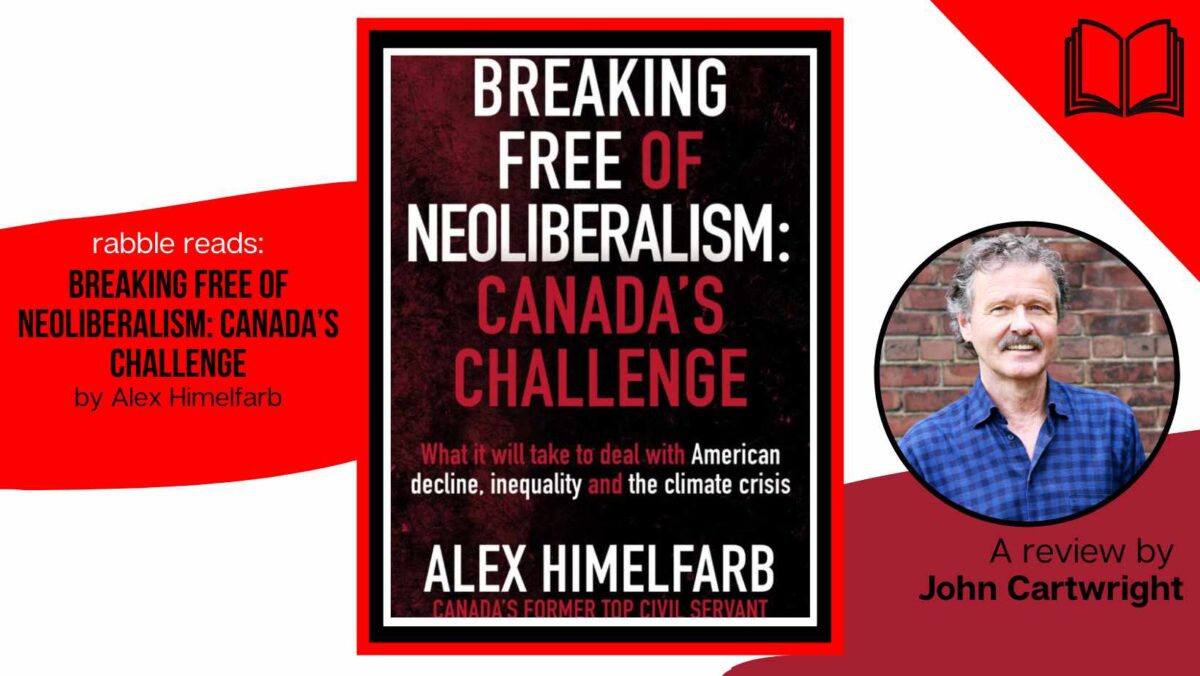If you are wondering what to buy friends for the holiday season, I have a recommendation. The new book by Alex Himelfarb Breaking free of neoliberalism: Canada’s challenge should be essential reading for anyone who cares about social justice and how our world is unfolding in 2025.
We all know that old slogan – if you want to know where you should be going, you have to know where you’ve come from. Himelfarb is in a unique position to remind us of where we have been as a country. For decades he served in senior positions in the federal public service, ultimately as Clerk of the Privy Council, the top civil servant position in Canada. He saw his role as a thought leader providing advice to the government of the day, including the implications of policies they were considering. And once he retired, he worked with many NGOs and helped guide the Canadian Centre for Policy Alternatives as it analyzed and challenged the corporate agenda of greed and austerity.
The frame for his analysis is based on the crucial thinking of the Italian revolutionary Antonio Gramsci – that in this time of “interregnum” there is an intense struggle for power that matches other epochs in our history. He traces the 1980’s with Reagan, Thatcher and free trade; the 2008 collapse of the financial markets; and today the post-COVID restructuring along with the new trade wars and massive increase of income inequality. And in each era distinct class interests attempt to shape the “hegemony of ideas”. Today we call that the narrative wars, and the sad reality is that right-wing authoritarianism is winning across the world, as demonstrated in the electoral successes of hardline conservatives nearly everywhere.
Of course, Himelfarb is very conscious of why neoliberalism had a bigger hill to climb in Canada than in the US. Whether it was Mulroney or the dramatic 1995 budget of Paul Martin that drove down funding for public services, there were always constraints and resistance by popular movements and civil society. Often the right-wing ground-breakers were to be found at the provincial level, slashing taxes and gutting labour rights while championing a resistance to federal programs.
People like Harper would take things to the next level, and while neoliberalism has been dealt several blows, no government has succeeded in finally putting it out of its – our – misery. It’s a theme that is repeating today, with Preston Manning as a key advocate and conservative premiers acting as shock troops in the drive for provincial rights to undermine the integrity of federal programs.
His examination of the impact of former US President Bill Clinton’s trade deals, former UK Prime Minister Tony Blair’s Third Way policies, and the similar pattern of former US President Barrack Obama’s decisions offers important insight into today’s mood of anger. The Tea Party launched in 2009 was no accident – it was a well-funded effort by wealthy business magnates like the Koch brothers to re-assert business supremacy and derail social justice initiatives. Here the so-called Freedom Convoy that occupied Ottawa in the winter of 2022 and spread to cities across this country, showed how deep the anger at government had grown and how raw our differences.
One section near the end of the book is entitled “The Assault on Our Collective Toolkit and the Political Imagination.” It is a brilliant reminder of how the establishment – media, think tanks, economists, politicians and CEO’s – helped marginalize any consideration of collective solutions to thorny problems like housing, lack of medicines, and soaring prices driven by soaring profits. People forget that in the 1970’s Canadians built a mass movement for housing that won rent controls, sweeping investment in non-market housing and measures to curb speculation.
The late Marvyn Novick, who played an invaluable role in social justice efforts in Toronto for many decades, once remarked that the best role for intellectuals like himself was to provide working people with the confidence to believe that they could fight for what they deserve.
In his final chapter, Alex Himelfarb does exactly that. He calls for us to embrace an optimism of the will and find alternatives that build a new spirit of solidarity. It’s about finding the path to common cause, even as we acknowledge our diverse interests. When we look back at the history of this country, it was in those moments when people united around key demands for justice that we were able to shape a better outcome. These are uncertain times, but when we have a clear idea of how we got here we can surely make the path by walking together to a better tomorrow.




